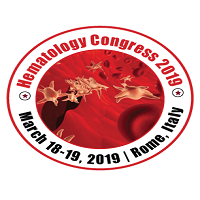Iman A Khaled
Theoder Bilharz Research Institute, Egypt
Title: Study of the relation between Egyptian patients with hepatocellular carcinoma and the genetic variations in DNA repair genes
Biography
Biography: Iman A Khaled
Abstract
Objective: DNA repair systems have been considered to maintain genomic integrity by countering threats caused by DNA lesions. Deficiency in the DNA repair pathways might make these lesions unrepaired or repaired incorrectly,
eventually leading to genome instability or mutations which may contribute directly to cancer. Thus, genetic differences, such as single nucleotide polymorphism (SNP) may contribute to carcinogenesis. Therefore, great
interests have been aroused in the exploration of the association of SNP of DNA repair proteins and cancer risk to provide better prediction of cancer. The deficiency of DNA repair capacity related to the polymor-phisms of DNA
repair genes might play a central role in the process of HCC tumorigenesis.
Materials & Methods: The study was conducted on 260 subjects classified into three groups; HCC group included 100 patients; a control group of 100 age and sex matched healthy volunteers and HCV positive HCC negative group
including 60 patients. Genotyping of XRCC1 3 and 7 genes were performed by real time PCR.
Results: XRCC1 G28152A (rs25487) heteromutant genotype (GA) was significantly higher in HCC patients than controls (57 % vs., 36%) and conferred almost three folds increase of risk among HCC (OR=2.735, 95% CI = 1.504 - 4.97, p value = 0.001), while the homomutant genotype (AA) was higher in HCC patients than controls (10% vs., 7%), but the difference was statistically non-significant (p value = 0.094). The frequency of XRCC3 C18067T (rs861539) variant genotypes were close to that of the controls and the difference was statistically non-significant (p value = 0.24, 0.37 for the CT, TT respectively). As for XRCC7G6721T (rs7003908) the heteromutant genotype (TG) was significantly higher in HCC patients than control (56% vs., 37%) and conferred almost 2 fold increases of risk of HCC (OR =2.167, 95% CI = 1.23-3.818, p value = 0.007). The homomutant genotype (GG) was lower in HCC patient than control (20 % vs., 32%), and the difference was statistically non-significant (p value =0.587). Coinheritance of the polymorphic variants of XRCC1 (GA, AA) and XRCC7 (TG, GG) was significantly higher in HCC cases than controls and was associated with increased HCC risk (OR = 2.765, 95% CI = 1.026 - 7.449, P value = 0.038).
Conclusion: The result obtained by the current study provide evidence that XRCC1 G28152A (rs25487) and XRCC7 G6721T (rs7003908) genetic polymorphisms have a role in susceptibility to HCC in Egyptian population.

